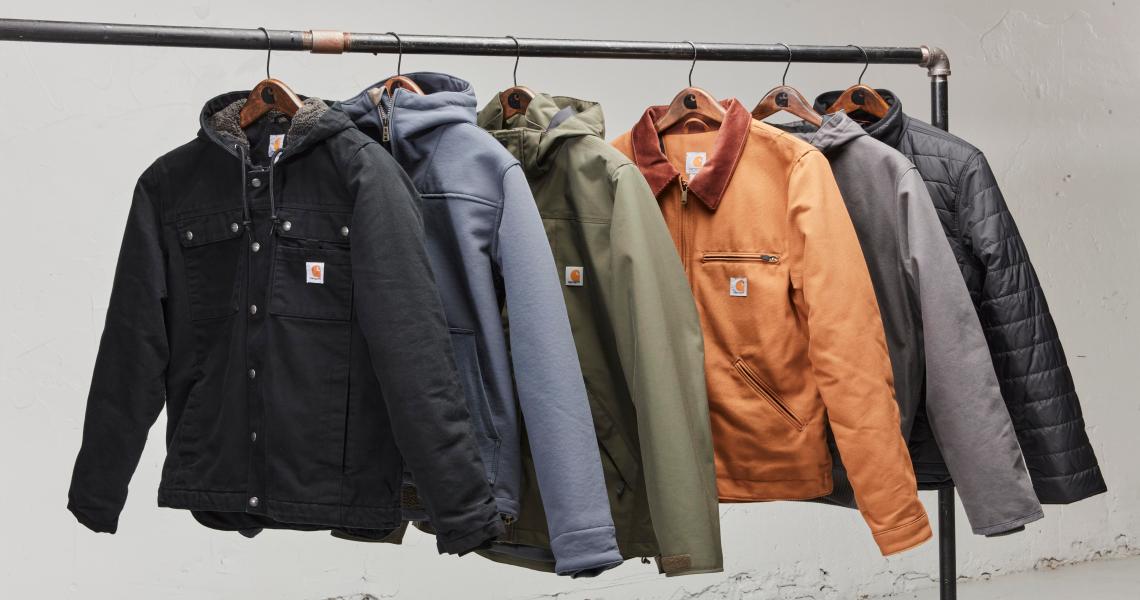Carhartt, the workwear brand also beloved by streetwear enthusiasts, was one of many brands that launched its own resale channel last year. It partnered with the resale-as-a-service company Trove to create a program called Carhartt Reworked.
Now, 11 months after first launching the program, Carhartt is expanding it. Initially, customers could only drop off pre-owned items in person at Carhartt stores, but as of Tuesday, the brand will also now accept free mail-in trade-ins from customers. It’s an addition that required both digital and physical investment from Carhartt and Trove. There’s a new digital questionnaire that consumers must fill out before they can send their items in, and Trove’s warehouses are now being used to store and process the clothing. For customers, no account is needed, and the payout is the same: a gift card in proportionate value that can be spent on new- or pre-owned Carhartt gear.
Since the initial launch of Reworked in March, Carhartt has resold nearly 70,000 products to over 22,000 customers in all 50 states. That’s a healthy business for a nascent resale channel, which experts in the resale industry told Glossy can take multiple years to reach high volumes of sales. Carhartt’s director of sustainability, Gretchen Valade, said the new investment in resale “represents another milestone in the evolution of Carhartt Reworked.”
“Carhartt’s quality and craftsmanship are two of the biggest reasons why a resale model works for the brand,” she said. “From the beginning, we’ve used top-notch materials and the finest craftsmanship to create gear that’s durable and meant to last. We launched Carhartt Reworked to extend the life of our gear, reduce clothing waste and keep previously worn and slightly imperfect gear out of landfills and on the job where it belongs.”
Carhartt’s rugged clothes, designed to hold up through years of wear and tear, make it a perfect candidate for resale. Fashion resale is nearly a $200 billion business globally, and outdoor brands like Carhartt, with its long shelf life, are a good match. Patagonia and REI, for example, have two of the largest branded resale channels in the industry by number of listings. Luxury brands including Rolex and Coach and streetwear brands like Nike and New Balance are also making use of branded resale, driven by their coveted status among collectors.
Gayle Tait, CEO of Trove, said features common among outdoor brands make them perfect for resale.
“Brands that make high-quality items can extract value out of those items by selling them multiple times while building connections with their customers, reinforcing loyalty and community and brand relevance,” Tait said.
In Trove’s annual resale report, released in March 2023, outdoor brands including REI and Arc’teryx were ranked among the top resale brands by global commerce company OSF Digital. The company considered brands’ positioning, listing volume and resale experience. Tait said Trove is planning to announce more new brand partners throughout the year spanning across outdoor, luxury and athleisure.
Emily Gittins, CEO of Archive, the company that powers resale for brands including New Balance, said that since she founded Archive in 2021, the total number of branded resale programs across the industry has grown from 36 to 124.
“We’ve learned a lot about what makes these programs successful,” Gittins said. “One is the brand having the quality of product that will hold up for a long time through resale. Two is a commitment from the brand to build brand awareness around resale.”
She said one consideration that brands need to keep in mind is product volume. A brand that’s just starting up probably shouldn’t spend time trying to resell clothes when it still needs to sell them the first time.
“For some brands, resale is something they want to do in the future, but they don’t have enough volume to have a liquid marketplace yet.”
By contrast, some brands with branded resale programs have thousands of listings available at any given time. For example, the hiking footwear brand Merrell has over 20,000 active listings on its branded resale shop. Meanwhile, resale service ThredUp reported that two out of every three brands with resale channels have fewer than 100 listings.




